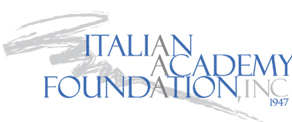IAF Issues Study on Italian American Population in New York State
The Italian Academy Foundation, Inc. has issued results of a study it commissioned by Roinila Research on the demographics of the Italian American population in New York State. The Italian Academy Foundation, Inc. (IAF) founded in 1947, will provide the entire work for use by private companies, non-profit organizations and other interested institutions and parties. The demographic study is believed to be the first ever to identify demographic patterns in the entire state of New York of individuals identifying themselves as being of Italian origin. The research and resulting report were prepared by Dr. Mika Roinila, PhD, an independent researcher, whose work meets accepted standards of the best demographic research. “We believe that this study is quite creditable and that the methods used are sound and reliable,” he stated.
“We are pleased with the resulting document and the care with which Dr. Ronila patterned the study,” according to Steve Acunto, Chairman of the Foundation. The study reveals that New York State has a substantial number of Italian Americans residing within its borders; that is, individuals self-identified as Italian Americans: “Those who identify themselves as Italian American or as having Italian American roots, however, are fewer than the actual number of those who are several generations into the population or who name another background as the dominant one when reporting. Thus, we believe that Italian roots in New York are larger than the actual number represented. We are delighted that Italian Americans constitute a major ethnic group in the State. We feel further that the residential pattern of Italians and Italian Americans in New York now signals the economic advancement of the community as a whole, as most of the wealthier regions in the state are now populated with Italian Americans as a substantial proportion of the population. Formerly an urban population generally clustered around jobs and work development in inner cities at the beginning of the 20th century, today Italian Americans populate some urban, many suburban and even rural or exurban locations throughout New York, while often retaining some roots in their families’ original urban environments. We trust that the Italian Academy Foundation’s study will prove a valuable service to individuals wishing to access the market commercially, culturally and politically, or wishing to identify the market for further study”, Mr. Acunto stated.
One conclusion the research could imply is that Italians and Italian Americans do constitute a substantial voting bloc, but, historically, as the research notes, Italian Americans vote along non- ethnic lines and, while it is easy to identify the thousands of municipal and other public officials of Italian extraction who have been elected to public office, the fact that they are of Italian origin is not necessarily a reflection of a population’s bias towards its “own”, Mr. Acunto noted, adding: “In fact, the Italian population which once voted largely along party-lines in the early and mid 20th century, now forms a part of each major political party in the state. Italian Americans hold elected posts that do not necessarily reflect the ethnicity of their local populations or their demographic proportion in it. This is a pleasing sign of the acceptance of Italian Americans and their independence; it demonstrates, as well, substantial post immigration and post ghetto progress. The fact that the last gubernatorial election was between a Cuomo and a Paladino makes the point, coincidentally, as does even a cursory look at the legislature and the courts, local office holders, important business and non profit leaders,” Mr. Acunto concluded.
The IAF, which publishes the Italian Journal quarterly and has published the first-ever bibliography of Italian Americas writers, numerous monographs and catalogues, has made a limited number of copies of the study available for governmental, media and not-for-profit groups for $50.00 per copy and to private enterprises for $100.00 per copy.
